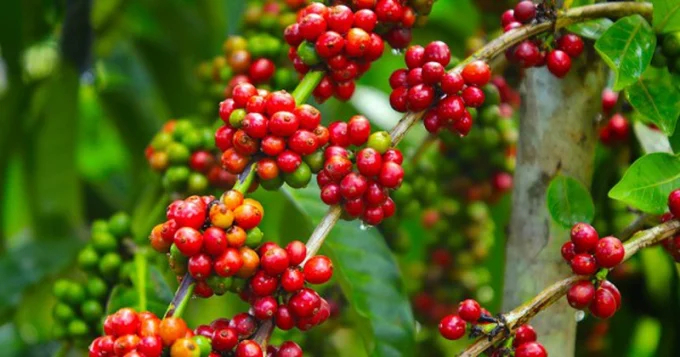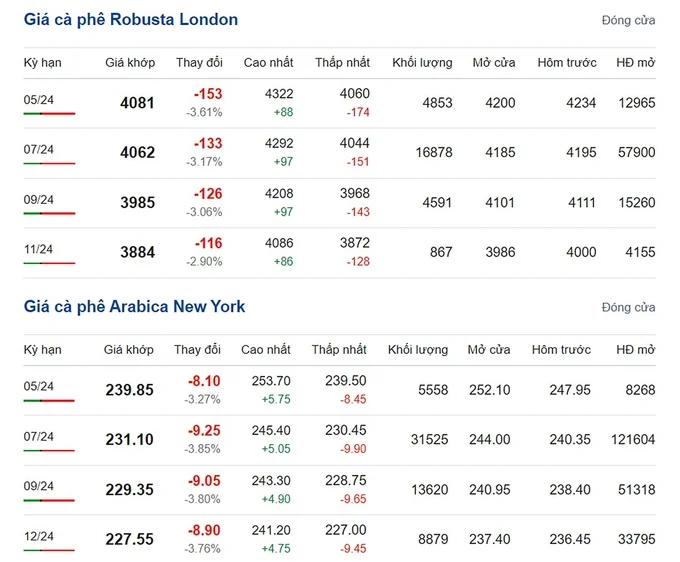May 21, 2025 | 06:06 GMT +7
May 21, 2025 | 06:06 GMT +7
Hotline: 0913.378.918
May 21, 2025 | 06:06 GMT +7
Hotline: 0913.378.918

The latest coffee market prices on 04/19/2024
On the global market, both the London and New York exchanges experienced significant declines on April 19.
In which, the price of Robusta on the London exchange for May 2024 delivery decreased by as much as $ 153; reaching the level of $ 4,081/ton. And the July 2024 delivery contract saw a sharp decrease by $ 133; at the level of $ 4,062/ton.
As for the New York exchange, the price of Arabica for May 2024 delivery dropped significantly by 8.1 cents; to the level of 239.85 cents/lb. And the July 2024 delivery contract experienced a substantial decline of 9.25 cents; at the level of 231.10 cents/lb.

Latest Arabica and Robusta coffee prices on 04/19/2024
The global coffee prices today saw a sharp decline of over 3% on both the London and New York exchanges. This downward trend in the agricultural commodity had been anticipated due to its previous excessive surge, necessitating a corrective phase. According to expert Nguyen Quang Binh, there is still a majority of buy orders on both exchanges.
Additionally, the sharp rise of the USD contributed to reducing coffee prices. This expert also noted that the recent gains in gold and cocoa markets have attracted funds from coffee. Strong selling from speculative funds on long positions further pushed down prices of this agricultural commodity.
At the time of assessment, the DXY index, measuring fluctuations of the greenback against 6 major currencies (EUR, JPY, GBP, CAD, SEK, CHF), rose to 106.16.
The USD strengthened following the release of a series of US economic data, reinforcing the belief that the economy is still on a solid growth trajectory. This implies that the Fed may postpone the timing of the first interest rate cut since 2020 until the end of this year.
Thus, global coffee prices on 04/19/2024 experienced a significant decline compared to the previous day.
In the domestic market, coffee prices on April 19 dropped by VND 2,000/kg compared to the previous day.
Specifically, in Lam Dong province, the districts of Di Linh, Bao Loc, and Lam Ha are trading at the same level of VND 119,600/kg.
In Dak Lak province, the district of Cu M'gar is currently purchasing at VND 120,000/kg. Meanwhile, the districts of Ea H'leo and Buon Ho are trading at a price of VND 120,000/kg.
In Dak Nong province, traders in Gia Nghia and Dak R'lap are trading at VND 120,200 and VND 120,100/kg, respectively.
In Gia Lai province, the district of Chu Prong is trading at VND 120,000/kg, while Pleiku and La Grai are maintaining the same price of VND 120,000/kg.
The purchasing price in Kon Tum province today is VND 120,000/kg.
Domestic coffee prices also saw a sharp decline today, bringing this agricultural product back to the threshold of VND 120,000/kg.
Thus, domestic coffee prices on 04/19/2024, are trading around the range of VND 119,600 - 120,200/kg.
Translated by Hoang Duy

(VAN) Oliyar, a prominent Ukrainian oil and fat manufacturer, has revealed plans to build a farm for 2.3 million laying hens in the Lviv region. The additional production quantities promise to change the competitive landscape of the egg market of the Eastern Europe region.

(VAN) On May 15, Ministry of Agriculture and Environment of Vietnam hosted the 'Connecting Vietnam - Germany agricultural, forestry and fishery trade' seminar in Berlin, Germany.

(VAN) In the face of counterfeit and imitation products, Khanh Hoa Salanganes Nest Company hopes for the prompt completion of the legal framework, strict enforcement against violations, and protection of the bird’s nest brand.

(VAN) Japan's efforts to lower the price of rice through the release of its stockpile may finally be making some progress, albeit at a snail's pace.

(VAN) U.S. tariffs are not only a 'shock', but also an opportunity for Vietnamese businesses to renew their mindset toward comprehensive development.

(VAN) As Bac Giang lychee enters the harvest season, Minister Do Duc Duy expects that the fruit will contribute greatly to agricultural exports due to standardized production and deep processing.

(VAN) Consumers have shown a preference for free-range eggs, but those farming systems are more vulnerable to biosecurity risks like bird flu.